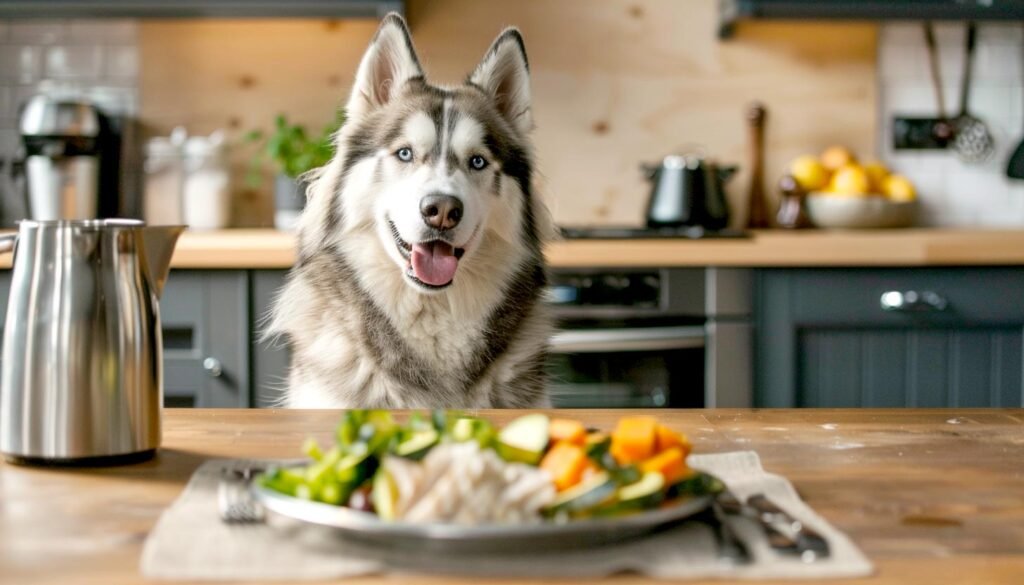Many dog owners question whether feeding eggplant to their four-legged friends is safe. As responsible pet parents, we want to provide delicious but also nutritious food options for our pups – and eggplant is often featured on menus around the world! But can this versatile veggie please pets as well?
You are wondering if it’s safe for your furry friend to munch on eggplant. Explore our comprehensive guide’s answer to Can Dogs Eat Eggplant? Discover potential risks and benefits for your canine companion.
Contents
- 1 Nutritional Overview of Eggplant
- 2 Can Dogs Eat Eggplant?
- 3 Eggplant Benefits for Dogs
- 4 Risks and Considerations
- 5 Cooking Methods for Dog-Safe Eggplant
- 6 Eggplant-Related Concerns: Toxicity and Allergies
- 7 What To Do If Your Dog Ate Eggplant
- 8 Conclusion: Investigating the Safety of Feeding Eggplant to Dogs
- 9 FAQs About Dogs And Eggplant
Nutritional Overview of Eggplant
Before we consider whether dogs can safely eat eggplant, let’s examine its nutritional profile. Eggplant boasts numerous vitamins, minerals, and antioxidants that provide health benefits to humans – but is this true for our furry companions as well?
Nutritional Value Of Eggplant:
| Amount Per 100 grams | % Daily Value* | |
| Calories | 25 | |
| Total Fat | 0.2 g | 0% |
| Saturated fat | 0 g | 0% |
| Cholesterol | 0 mg | 0% |
| Sodium | 2 mg | 0% |
| Potassium | 229 mg | 6% |
| Total Carbohydrate | 6 g | 2% |
| Protein | 1 g | 2% |
Eggplant is low in both calories and fat content, making it an excellent way to supplement a dog’s diet for those watching their weight. Furthermore, eggplant contains plenty of dietary fiber which aids digestion while helping regulate bowel movements – essential components for maintaining good gastrointestinal health and avoiding constipation – an increasingly prevalent issue among canines.
Vegetables like eggplant provide significant amounts of vitamin A, which supports eye and immune health, and vitamin C, an antioxidant that protects cells against damage caused by free radicals. Furthermore, eggplant’s abundant supply of vitamin K contributes significantly to blood clotting and bone health.
Mineral-wise, eggplant provides potassium. An electrolyte is essential for proper nerve and muscle function in our canine companions. That may also regulate heart rhythm and blood pressure regulation, making eggplant an arguably heart-healthy treat. Furthermore, eggplant also contains magnesium, which supports nervous system health along with bone health benefits.
Antioxidants are another key component of eggplant’s nutritional profile. These compounds help neutralize free radicals in your body, decreasing the risk of chronic diseases while improving overall health. Eggplant contains various antioxidants such as nasunin, chlorogenic acid, and anthocyanins that contribute to its vibrant colors as well as potential health advantages.

Can Dogs Eat Eggplant?
Now that we understand the nutritional content of eggplant, let’s address a crucial question: Can dogs eat eggplant? The answer is both yes and no, depending on various factors.
Cooked eggplant without added seasonings is usually safe for dogs in moderation. Ensure careful preparation to avoid exposing your dog to harmful ingredients. Roasted or boiled eggplant can offer good nutrition as a treat. Avoid serving eggplant dishes seasoned with garlic, onions, or excessive salt. These ingredients can pose hazards to your dog’s health.
However, it’s essential to remain cognizant of any potential allergic or sensitivities your dog may have to eggplant. Some dogs may experience digestive upset from eating eggplant; others may show no adverse symptoms at all. When first adding eggplant into their diet for the first time, start off slowly and observe closely for signs of discomfort or allergic reactions.
Cooked eggplant may be added to your dog’s diet as an occasional treat, but make sure that it’s prepared plain without any potentially harmful ingredients. Also, keep your canine’s individual sensitivities and risks associated with feeding eggplant in mind when providing it to them. Always consult with a veterinarian prior to adding new foods into their diet to ensure their safety and well-being.
Eggplant Benefits for Dogs
While eggplant may not be a staple in their diets, it does offer several potential health advantages when consumed in moderation.
Eggplant and Dietary Fiber: Eggplant is packed with dietary fiber, making it an essential ingredient in maintaining digestive health for dogs. Fiber helps regulate bowel movements, prevent constipation, and promote beneficial gut bacteria development – all key elements for optimal digestive well-being in canines. Including eggplant in their diet could contribute to an efficient digestive system and may alleviate some gastrointestinal issues altogether.
Vitamin and Mineral Contents of Eggplant: Eggplant contains essential vitamins and minerals essential for overall dog health and well-being, such as Vitamin A for supporting vision health, Vitamin C as an antioxidant supporter of immunity, potassium to regulate heart rhythm and blood pressure regulation as well as magnesium which benefits nerve and muscle functions.
Antioxidants: Eggplant contains various antioxidants such as nasunin, chlorogenic acid, and anthocyanins that act to neutralize harmful free radicals within the body and reduce chronic diseases such as cancer and heart disease – ultimately contributing to longer lifespan and greater vitality for dogs.
Hydration: Eggplant has a high water content, making it an effective way to hydrate your dog during hotter weather or periods of increased physical activity. Maintaining optimal health requires maintaining optimal hydration levels to prevent dehydration from leading to serious health problems in dogs.
Low in Calories and Fat: Eggplant is low in calories and fat content, making it an excellent way to help control weight or maintain health in dogs who need to watch their weight or maintain good body condition. Incorporating eggplant as part of your dog’s daily meal or treat as an anti-obesity strategy may prevent obesity as well as associated health conditions like diabetes or joint issues.
Risks and Considerations
While eggplant may provide numerous health advantages for dogs, it’s essential that pet parents be aware of potential risks and considerations associated with its consumption.
1. Solanine Toxicity: Eggplant belongs to the nightshade family of plants and contains solanine, a toxic chemical which is harmful if consumed in large amounts by dogs. While solanine levels in the flesh of eggplant tend to be relatively low, other parts such as the leaves and stems of this plant contain higher concentrations. To minimize solanine toxicity risk for your pet it’s crucial that all parts other than flesh be fed – only edible parts like flesh should be fed!
2. Gastrointestinal Upset: Some dogs may experience digestive distress from eating eggplant, especially when introduced suddenly or in large amounts. Signs of upset include vomiting, diarrhea, abdominal pain, and bloating. If this happens to your pup after consuming eggplant it’s best to discontinue feeding it to them immediately and consult your veterinarian if symptoms continue.
3. Allergic Reactions: Just like humans, dogs may also develop allergic reactions to specific foods – including eggplant. While such reactions are relatively rare in pups, they have been reported when exposed to other members of the nightshade family such as tomatoes or potatoes. If you suspect your dog might be sensitive to eggplant, monitor for signs like itching, hives, swelling, and difficulty breathing before seeking professional veterinary assistance as soon as possible.
4. Choking Hazard: Eggplant can present a potential choking hazard for dogs depending on how it’s prepared, particularly if consumed in large chunks or pieces. To reduce this risk of choking it’s essential that eggplant be cut into bite-sized pieces or pureed before feeding it to them and always ensure they chew thoroughly and safely while they eat their food.
5. Prep and Seasonings: When feeding eggplant to your dog, it’s essential that it be prepared plain without adding seasonings, spices, or ingredients that could potentially harm their health – garlic, onions, or excessive salt should all be avoided as these substances could potentially be toxic or detrimental to their wellbeing. Stick with simple cooking methods like boiling, steaming, or roasting while offering either plain eggplant or mixed in with other pet-safe ingredients for best results.
As eggplant can be included as an occasional treat or supplement in your dog’s diet, it’s essential that you are aware of its possible risks and take appropriate precautions before feeding it to them. By understanding these risks and taking appropriate steps to address them, feeding eggplant will become both an enjoyable and safe experience for both of you! Please consult your veterinarian if any concerns or questions arise regarding its consumption.
Cooking Methods for Dog-Safe Eggplant
When selecting cooking methods that will result in safe, digestible eggplant for your canine companion, select ones that adhere to safe practices that ensure digestion is efficient and safe. Here are a few suggestions for dog-friendly methods of preparation:
Boiling: Boiling eggplant can be an efficient and straightforward method of providing your dog with a delicious meal. Simply chop up small pieces and boil in water until soft and tender – an easy method for digestible results that you can serve plain or combine with other dog-approved ingredients for extra variety!
Steaming: Steaming is another gentle cooking method that preserves the nutritional integrity of eggplant while making it soft and palatable for dogs. Simply steam until tender but not mushy before allowing it to cool before giving it to your pup as an individual snack or combined with other dog-safe food items.
Roasting: Roasting eggplant can greatly enhance both its flavor and texture, creating an irresistibly delicious treat for your furry friend. Cut eggplant into cubes or slices, mix with some olive oil, and roast in the oven until it becomes golden brown and tender – be wary of adding any seasonings or spices that might harm them, then allow to cool before giving to them as treats!
Grilling: Grilling eggplant can create a tantalizing smoky flavor that dogs may find irresistible, though it must be done without adding seasonings or marinades that could contain potentially harmful ingredients for them. Simply slice thin rounds, brush with olive oil, and grill until tender but slightly charred; allow it to cool before offering to your pup!
Pureeing: For dogs that have difficulty with chewing or swallowing solid foods, pureeing eggplant may make eating easier for them. Simply cook eggplant according to one of the methods outlined above and then puree in either a food processor or blender to create a creamy puree that they can mix with other nutritious dog-friendly ingredients such as cooked rice or lean protein for a tasty and easily digestible meal.
Eggplant-Related Concerns: Toxicity and Allergies
Though eggplant can be an ideal addition to your dog’s diet when prepared correctly, it’s essential that you remain aware of any possible toxicity issues or allergies related to this food source.
Solanine Toxicity: Eggplant, like other nightshade vegetables, contains solanine which is toxic for dogs when consumed in large quantities. This substance should only be given in moderation to avoid potential issues. Even though solanine levels in eggplant flesh tend to be low, other parts of its plant, including its leaves and stems, contain higher concentrations. If your dog ingests large quantities of eggplant leaves or stems, they could experience symptoms of solanine toxicity such as abdominal upset, diarrhea, drooling, lethargy, weakness, and tremors – in extreme cases, it could even result in seizures and death! To reduce risk and ensure their safety it’s vital that any parts other than flesh of eggplant plants not fed directly to them be avoided and monitored closely for signs of poisoning.
Allergic Reactions: While eggplant allergies in dogs are relatively uncommon, they do exist and should be monitored closely as symptoms may include itching, hives, redness, or digestive upset after indulging. Symptoms could range from itching and hives to swelling and redness and possibly anaphylaxis requiring immediate medical care; so it is imperative that any suspected reactions be closely monitored by you and discussed with a veterinarian for evaluation and management purposes.
Cross-Reactivity: Dogs who already suffer from food allergies or sensitivities may be more prone to allergic reactions from related foods; this phenomenon is known as cross-reactivity. Since eggplant belongs to the same botanical family as tomatoes, potatoes, and peppers, those allergic to it may also develop an adverse reaction from eating eggplant. It’s essential that any dog with food sensitivities be introduced gradually into their diet with eggplant gradually being introduced at first before monitoring closely for signs of adverse reactions or allergic reactions.

What To Do If Your Dog Ate Eggplant
When your pup accidentally consumes eggplant, it’s vitally important that appropriate steps be taken in order to ensure their safety and well-being. Below is what should happen next if it appears your pup may have consumed eggplant:
Evaluate the Situation: If your dog is seen eating eggplant or there are signs that they have consumed it (such as chewed-up pieces or leftovers), take note of how much of it they may have ingested, as well as whether any other parts of the plant were consumed, this information will assist in assessing potential risks and developing an action plan to take.
Monitor Your Dog for Symptoms: Keep an eye out for signs of eggplant toxicity in your dog, such as vomiting, diarrhea, abdominal pain, drooling, lethargy, weakness, tremors, or difficulty breathing. Depending on the amount consumed and individual sensitivity levels, symptoms could differ according to the quantity eaten; so it is crucial that you remain vigilant and act quickly if any concerning signs arise.
Consult Your Veterinarian: If you suspect your dog has consumed too much eggplant or is experiencing serious symptoms, seek medical advice immediately from their veterinarian. Provide as much information as possible about the situation. For example, whether any ingredients or spices are present in addition to the quantity consumed. Describe current symptoms – in order to make an assessment. The next steps to be taken are suggested accordingly.
Adhere to Veterinarian’s Recommendations: Your veterinarian may suggest various courses of action depending on the information you provide, including inducing vomiting in order to expel eggplant from your dog’s system, administering activated charcoal as a toxin absorber, or providing supportive care services in order to manage symptoms. Make sure you adhere closely to their recommendations, seeking medical assistance immediately should any appear necessary.
Prevent Future Incidents: To keep your dog from accidentally eating eggplant or other potentially hazardous foods in the future, take steps to keep all food items out of his or her reach and out of reach. Educate yourself and your family members about potential hazards associated with certain foods; as well as being vigilant in monitoring his or her environment in order to ensure his or her safety.
Conclusion: Investigating the Safety of Feeding Eggplant to Dogs
To conclude, the safety of feeding eggplant to dogs depends on several factors, including its preparation method, quantity eaten, and individual canine sensitivities. While eggplant can provide nutritious and tasty treats when prepared plain and consumed moderately, it’s essential that its consumption be done so mindfully in terms of potential risks or concerns associated with its consumption.
Cooked eggplant offers numerous health benefits for dogs when prepared without seasonings or harmful additives, including dietary fiber, vitamins, minerals, and antioxidants. These nutrients support digestive health, immune function, and overall well-being in our canine companions.
As eggplant can be added to your dog’s diet as an occasional treat or supplement, it’s essential that you are aware of its potential risks and benefits in order to make informed decisions regarding your furry friend’s nutrition. By adhering to these guidelines and prioritizing their health and safety, sharing eggplant will become part of a balanced and nutritional diet for both of you.
FAQs About Dogs And Eggplant
Q: Can dogs eat raw eggplant?
A: While small amounts of cooked eggplant are generally safe for dogs, raw eggplant can be difficult for them to digest and may cause gastrointestinal upset.
Q: Are eggplant leaves toxic to dogs?
A: Yes, eggplant leaves and stems contain solanine, which can be toxic to dogs if ingested in large quantities.
Q: Can dogs eat eggplant parmesan?
A: Eggplant parmesan typically contains ingredients like cheese and breadcrumbs, which may not be suitable for dogs. It’s best to avoid feeding your dog dishes that contain these ingredients.
Q: Can dogs eat eggplant and tomatoes together?
A: While both eggplant and tomatoes are safe for dogs in moderation, it’s essential to monitor your dog for any adverse reactions, as some dogs may be sensitive to certain fruits and vegetables.
For more information on dog nutrition and health, check out our other articles:



